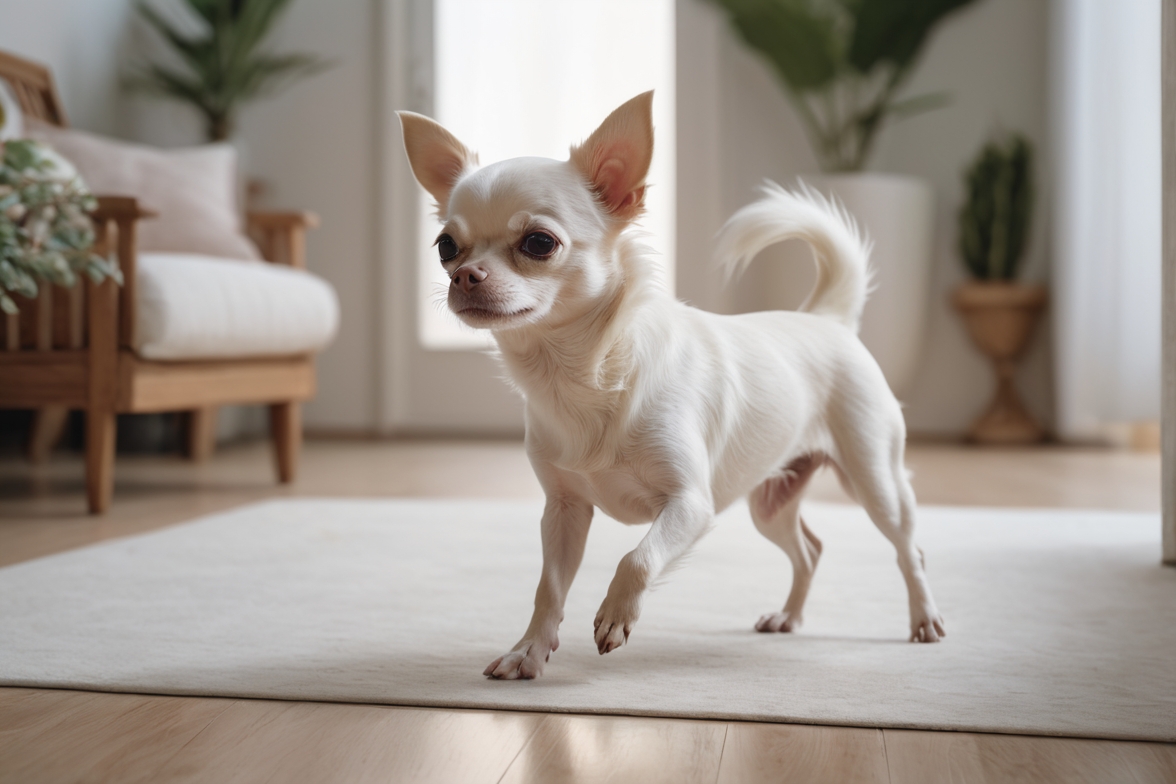Chihuahua Constipation: Managing Digestive Health of Chihuahuas

Key Takeaways:
- Chihuahua constipation can occur at any life stage: puppy, adult, or senior. It is important to recognize the symptoms early to prevent complications.
- There are several causes of constipation in Chihuahuas, including lack of exercise, dehydration, and underlying health issues. Proper care and management can help alleviate these symptoms.
- Understanding the specific needs of each life stage is crucial for managing and preventing constipation in Chihuahuas. From diet adjustments to exercise, different solutions are effective for puppies, adults, and seniors.
1. Common Causes of Constipation in Chihuahuas
Understanding the causes of constipation in Chihuahuas can help pet owners prevent and effectively manage this uncomfortable condition. By addressing the root cause, it is possible to maintain your Chihuahua’s digestive health and ensure a comfortable lifestyle.
- Dehydration: One of the most common causes of constipation in Chihuahuas is dehydration. When a dog does not drink enough water, the body tries to conserve fluids, which results in dry and hard stool. Ensuring that your Chihuahua always has access to fresh, clean water can help prevent constipation. This is especially important for older Chihuahuas, who may be more prone to dehydration due to a reduced sense of thirst.
- Lack of Exercise: Chihuahuas are a small breed, and they do not always get enough physical activity. A lack of regular exercise can slow down the digestive system, making it harder for the body to move stool through the intestines. Encouraging your Chihuahua to engage in light activities, such as short walks or playful activities, can help keep their digestive system functioning smoothly.
- Dietary Issues: Poor diet is a significant contributor to constipation in Chihuahuas. Diets that are low in fiber or consist mainly of processed foods can make bowel movements difficult. Including high-fiber foods, such as vegetables or fiber supplements, in your Chihuahua’s diet can help add bulk to their stool and make it easier for them to pass. However, always consult your veterinarian before making any dietary changes.
2. Recognizing the Signs of Constipation

It is important to recognize the symptoms of constipation in Chihuahuas early on. Being able to identify these signs will help you take timely action to prevent further discomfort and potential complications.
2.1 Straining and Difficulty Defecating
One of the primary signs of constipation is straining during defecation. Your Chihuahua may attempt to pass stool multiple times without success or may produce small, hard stools. Straining can also cause your dog to become visibly uncomfortable, and they may adopt a hunched posture or whine during attempts.
If you notice that your Chihuahua is taking longer than usual to defecate or is making multiple unsuccessful attempts, it is likely a sign of constipation. This is especially concerning if the dog is visibly distressed, as prolonged straining can lead to more serious issues, such as rectal prolapse or even ruptures in severe cases. Paying attention to your dog’s body language during bathroom breaks is crucial for early detection.
2.2 Loss of Appetite
A loss of appetite can be another sign that your Chihuahua is experiencing constipation. When the digestive system is not functioning correctly, it can cause discomfort, which may lead to a reduced interest in eating. Constipation may also make the stomach feel full, even when it isn’t, which results in your dog refusing food.
If your Chihuahua is not eating as usual, especially if accompanied by other symptoms like lethargy or discomfort, it could indicate constipation. Always consult your veterinarian if a change in appetite persists, as it can also be a sign of other underlying health conditions. Addressing the constipation may help restore your Chihuahua’s normal appetite.
2.3 Abdominal Pain and Bloating
Chihuahuas experiencing constipation may exhibit signs of abdominal pain or bloating. You may notice your dog’s stomach feeling hard or distended, and they might react when their abdomen is touched. Abdominal discomfort is often caused by the build-up of stool in the intestines, leading to a bloated sensation.
If your Chihuahua appears to be in pain, has a swollen belly, or shows signs of discomfort when the stomach is touched, this could indicate constipation or other gastrointestinal issues. It’s important to seek veterinary attention if you suspect your dog is in pain, as prolonged constipation can lead to more serious complications, such as intestinal blockage.
| Signs of Constipation | Description | What to Do |
|---|---|---|
| Straining | Difficulty passing stool, visible effort | Consult vet if prolonged |
| Loss of Appetite | Reduced interest in food, skipping meals | Monitor closely, consult vet if persistent |
| Abdominal Pain/Bloating | Hard, distended stomach, sensitivity | Seek veterinary assistance |
3. Remedies for Chihuahua Constipation

If you notice signs of constipation in your Chihuahua, there are several remedies that can help alleviate the symptoms. However, it is always best to consult with your veterinarian before attempting any treatments to ensure your dog’s safety.
- Increase Water Intake: One of the simplest ways to help relieve constipation is by increasing your Chihuahua’s water intake. Dehydration is a common cause of constipation, and providing ample clean water can help soften stool and promote easier passage. You can also consider adding a little water to your dog’s food or offering ice cubes as a treat to encourage more fluid intake.
- Adjust Diet for More Fiber: Adding fiber-rich foods to your Chihuahua’s diet can help improve bowel movements. Foods such as canned pumpkin or specially formulated dog food that contains added fiber can help regulate digestion and make stool softer. Always introduce dietary changes gradually to avoid causing digestive upset, and consult with your veterinarian for the appropriate amount of fiber.
- Exercise and Physical Activity: Ensuring that your Chihuahua gets adequate physical activity is crucial for maintaining a healthy digestive system. Regular exercise can help stimulate the digestive tract and promote bowel movements. Activities like short walks, gentle play, or interactive games can help keep your Chihuahua active, even if they are experiencing mild constipation.
3.1 Home Remedies for Immediate Relief
If your Chihuahua is experiencing mild constipation, there are some safe home remedies that you can try under the guidance of your veterinarian. Adding a small amount of canned pumpkin to their food can provide extra fiber and help promote easier stool passage. Pumpkin is a natural source of fiber that is gentle on the digestive system and often palatable for dogs.
Another effective home remedy is giving your Chihuahua a small amount of olive oil. Adding a teaspoon of olive oil to your dog’s meal can help lubricate the digestive tract, making it easier for them to pass stool. However, it is essential to use only a small amount, as too much oil can lead to diarrhea or an upset stomach. Always consult your vet before trying any home remedies.
3.2 Over-the-Counter Remedies
In some cases, your veterinarian may recommend an over-the-counter laxative that is safe for dogs. These laxatives are typically formulated to soften the stool, making it easier for your Chihuahua to pass. It is crucial to only use laxatives specifically prescribed or recommended by your veterinarian, as not all human medications are safe for dogs.
Never administer any medication without consulting your veterinarian first. They will provide guidance on the correct dosage and type of laxative suitable for your Chihuahua’s specific condition. Misusing laxatives can lead to serious health complications, such as dehydration or electrolyte imbalances, so it is important to follow professional advice.
3.3 When to Seek Veterinary Attention
If your Chihuahua’s constipation persists for more than 48 hours, or if they show signs of severe discomfort, it is time to seek veterinary attention. Chronic constipation can lead to more severe complications, such as megacolon or intestinal blockage, which require medical intervention. Your vet may conduct an examination or recommend diagnostic tests, such as X-rays, to determine the underlying cause and provide appropriate treatment.
In some cases, your veterinarian may need to perform an enema to help relieve the constipation. This procedure should only be done by a professional, as improper administration can cause serious harm to your dog. Early intervention is key to preventing complications, so do not hesitate to contact your veterinarian if your Chihuahua’s symptoms do not improve.
4. Preventing Constipation in Chihuahuas

Preventing constipation is always better than treating it, and there are several steps you can take to ensure your Chihuahua maintains regular bowel movements and good digestive health.
- Provide Fresh Water: Ensure that your Chihuahua always has access to fresh, clean water. Staying hydrated is one of the most important factors in preventing constipation, especially for senior Chihuahuas, who may be more prone to dehydration.
- Maintain a Balanced Diet: Feed your Chihuahua a diet that includes the right balance of nutrients, including fiber. High-quality dog food formulated for small breeds often contains the appropriate fiber content to promote digestive health. Avoid giving your Chihuahua table scraps or foods that are high in fat, as these can contribute to digestive issues.
- Regular Exercise: Encourage your Chihuahua to stay active with daily exercise. Whether it’s a walk around the neighborhood or a game of fetch in the yard, physical activity helps stimulate the digestive system and prevent constipation.
| Preventative Measures | Benefits |
|---|---|
| Fresh Water | Prevents dehydration, softens stool |
| Balanced Diet | Promotes digestive health |
| Regular Exercise | Stimulates digestive system |
5. Wrap Up
Chihuahua constipation can be managed and prevented with proper care and attention. By recognizing the early signs, providing a well-balanced diet, and ensuring your dog stays hydrated and active, you can help maintain their digestive health. If your Chihuahua does experience constipation, there are various remedies available, but always consult with your veterinarian before trying any treatments. With the right approach, you can keep your Chihuahua comfortable, healthy, and happy.
Frequently Asked Questions (FAQ)
- How often should a Chihuahua have a bowel movement?
Chihuahuas should ideally have at least one bowel movement per day. However, individual patterns can vary based on diet, age, and activity level. - Can stress cause constipation in Chihuahuas?
Yes, stress can affect a Chihuahua’s digestive system, potentially leading to constipation. Major changes, such as moving homes or introducing a new pet, can trigger stress-related constipation. - Is canned pumpkin safe for Chihuahuas with constipation?
Yes, canned pumpkin is generally safe for Chihuahuas and can help with constipation due to its high fiber content. Always use plain, unsweetened pumpkin and consult your vet for the correct amount. - Can I use human laxatives for my Chihuahua?
No, human laxatives are not safe for Chihuahuas unless specifically prescribed by a veterinarian. Only use products recommended by your vet to avoid harmful side effects. - Why is my senior Chihuahua more prone to constipation?
Senior Chihuahuas are more prone to constipation due to a slower metabolism, reduced physical activity, and a decreased sense of thirst. Ensuring they stay hydrated and active can help prevent constipation.






